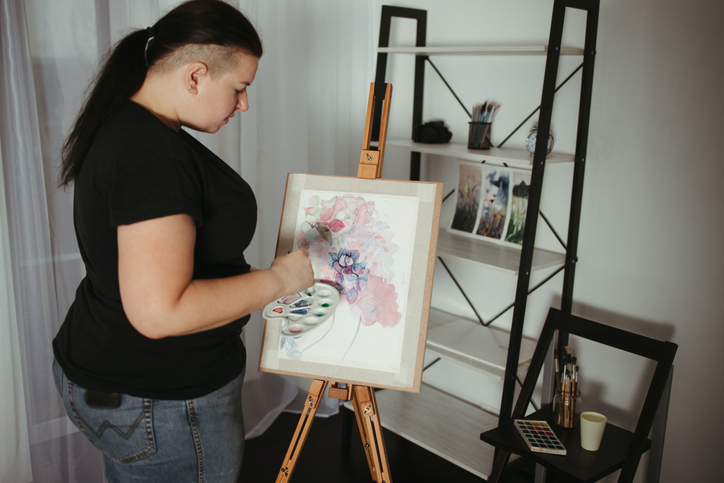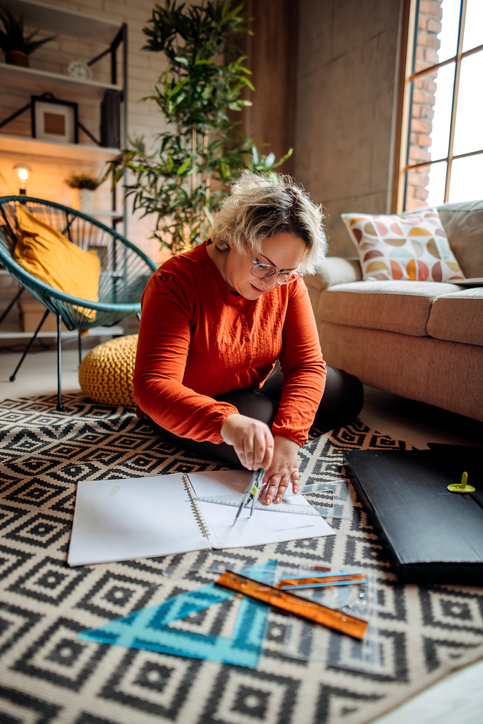Creative Arts: Enhancing Mental Health and Well-being
Creative arts are used in supporting mental health care in a variety of ways. Art therapy uses creative means to treat mental illnesses and improve mental health. It can involve various treatments, such as theater therapy, dance movement psychotherapy, music therapy, poetry, pottery drawing, painting and craft therapy. Art therapy uses integrative techniques to captivate the soul, body and mind in ways that verbal expression alone doesn't appear to (Shukla). Below are a few examples of how creative arts are being tapped to support mental health treatment and recovery.

Online art therapy
Researchers in Scotland looked at the potential of an online art therapy program to support adults living in rural communities. The art therapy was provided by two experienced art therapists and offered to clients on an individual basis in eight one-hour weekly online sessions. Participants were offered a variety of traditional art materials (delivered to them) and were also given the option to use digital artmaking tools. The participants described the online art therapy as a judgment-free zone that allowed the freedom to experiment, express and feel, and increased their understanding of self and others. The researchers concluded that “online art therapy, as demonstrated in this study, can be a relevant and welcomed intervention for adults living in rural and less populated areas.” While they noted the investment in the set-up and team involvement was substantial, they concluded that the “potential benefits seem to outweigh the effort.”
Helping Isolated Teens
Art therapies are also helping teens with mental health challenges, especially teens who are separated from peers. Researchers used an art intervention to help facilitate identity development in teens recovering from mental health conditions.
The researchers developed a unique open studio intervention. The art intervention involved an open setting where the therapist provides a setting with minimal instructions. The therapist chose the materials that were available, but everything else was up to the participant. The participating students were all unable to participate in their typical school setting and were attending a therapeutic day school. They met at least once a week for one-and-a-half to three hours over the 10-month school year.
Over the year, the researchers saw positive changes in the participants’ identity development. Among the key elements in the success of the program were the therapists’ commitment to supported autonomy; the absence of specific demands; the emphasis on the creative process over the product (they didn’t need to share their artwork); and the use of setting and materials to promote the healing process. They concluded that art-based intervention could be effective in helping “socially isolated teens to manage their social anxiety, develop their identity, and transition back into their peer environments.”

Improving Care and Quality of Life for People with Dementia
Numerous art therapies for patients with dementia have been developed in recent years. One recent study sought to compare the effectiveness of various art-related therapies in improving cognitive function, activity of daily function, depression and anxiety symptoms, agitation behavior and quality of life for people with dementia.
They found that reminiscence therapy significantly improved cognitive function. Reminiscence therapy, also called remembrance therapy, refers to review and discussion of past activities and experiences, usually with the aid of tangible prompts, such as photographs or music. They also found that horticultural therapy (engaging in gardening activities facilitated by a trained therapist) significantly decreased agitation behavior. Calligraphy therapy, which in this study referred to Chinese calligraphy handwriting, significantly improved cognitive function and improved quality of life.
Helping During Pregnancy and Post-partum
Art-based interventions may be helpful for pregnant and postpartum women, according to a recent study. During pregnancy and following childbirth is a time many women experience mental health challenges. An analysis of 21 randomized controlled studies of art-based interventions found a significant reduction in symptoms of anxiety and depression. Most of the studies involved music therapy or singing therapy and the researchers noted that participants’ ability to select the music improved the results.
“Art-based interventions seemed to be interesting, safe and cost-effective for women”, and “could provide a new avenue for preventing perinatal mental health problems and help to reduce the likelihood of developing a mood disorder and needing pharmacological treatment,” the authors concluded.
Creative arts and well-being
In addition to targeted art therapy, simply engaging in creative activities can boost your mental health. A new survey from APA finds about half (46%) of Americans use creative activities to relieve stress or anxiety, such as playing the piano, crocheting a blanket, dancing with friends or solving crossword puzzles. Americans who rate their mental health as very good or excellent tend to engage in creative activities more frequently than those who rate their mental health as fair or poor. Read more.
References
- Liu, Q., Wang, F., Tan, L., Liu, L., Cheng, H., & Hu, X. (2023). Comparative efficacy of various art therapies for patients with dementia: A network meta-analysis of randomized controlled trials. Frontiers in psychiatry, 14, 1072066. https://doi.org/10.3389/fpsyt.2023.1072066
- Goodman-Casanova JM, et al. 2023. Effectiveness of museum-based participatory arts in mental health recovery. Int J Ment Health Nurs. 2023 Jul 5. doi: 10.1111/inm.13186. Online ahead of print.
- Zubala A, et al. 2023. Online art therapy pilot in the Western Isles of Scotland: a feasibility and acceptability study of a novel service in a rural community. Front Psychiatry. 2023 May 22;14:1193445. doi: 10.3389/fpsyt.2023.1193445.
- Qian J, et al. 2023. Art-based interventions for women's mental health in pregnancy and postpartum: A meta-analysis of randomized controlled trials. Front Psychiatry. 2023 Feb 15;14:1112951. doi: 10.3389/fpsyt.2023.1112951.
- Kelemen LJ, Shamri-Zeevi L. 2022. Art Therapy Open Studio and Teen Identity Development: Helping Adolescents Recover from Mental Health Conditions. Children (Basel). 2022 Jul 11;9(7):1029. doi: 10.3390/children9071029.PMID: 35884014
- Shukla A, et al. 2022. Role of Art Therapy in the Promotion of Mental Health: A Critical Review. Cureus. 2022 Aug 15;14(8):e28026. doi: 10.7759/cureus.28026.
